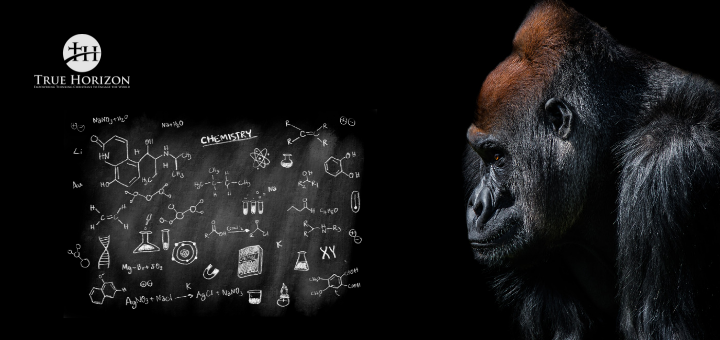Why Evolution Is A Myth
Materialism is a philosophy that says matter, energy, space, and time can explain everything about the world we live in. Everything. So, it follows that if materialism is true, the only way to explain the existence of life is by rearranging the stuff we find in the physical world. That’s exactly what Darwinian Evolution purports to do. It’s a pseudo-scientific support system for materialist philosophy. And since science is the method we use to understand the physical world, materialists insist that Evolution is a scientific fact. For them, it has to be. But when you look closely, you find that Darwinian Evolution is not very scientific. In fact, it has all the characteristics of an ancient creation story. Evolution is a myth.
Defining ‘Evolution’
Before I share the reasons I have for saying that, I want to be clear about what I mean by “Evolution.”
It is undeniably true that living organisms evolve. They change over time. And they adapt to their environments. Neither of those facts is controversial. But when I say “Darwinian Evolution” I put it in capital letters for a reason.
Darwinian Evolution as I refer to it here is the idea that all life can be traced back to inert matter. That matter somehow arranged itself into chemical compounds. Those chemical compounds found a way to reproduce themselves. And those original compounds are the basis for every form and feature of every living thing that has ever existed.
That is what I’m calling a myth.
The Purpose of Mythology
In their 5-part blog series, Evolution as Mythology, PhD scientists Hugh Henry and Charles Cruze, along with theologian Dan Dyke, discuss the nature of myths. They point out that all societies have them. They’re a way to explain the foundations of a culture and to “validate [its] thinking, practices, and ideals.” These myths always include some kind of creation story. It always involves a powerful, supernatural “god” who creates the world and brings forth life.
Evolution fits this template. It is exactly this kind of myth. Darwinian Evolution makes materialistic assumptions about the origin and nature of life. It includes an agent capable of designing all life forms (natural selection). And it identifies a prophet who informs us of the myth (Darwin). Today, we even have a Darwinian priesthood that defends the myth and will not tolerate any dissent from the story it’s telling.
Defining Science
We know that science is the study of natural causes and effects. But beyond that, there is no rigid definition of what constitutes “science.” The authors of the blog series cited above point out that we usually try to describe science by the process called the “scientific method.” Typically, this includes:
- Making an observation about a natural phenomenon.
- Formulating a hypothesis meant to explain the phenomenon.
- Performing controlled experiments to test the hypothesis.
- Revising the hypothesis based on experimental results.
We observe some phenomenon and try to determine its cause. Once the cause is identified we don’t just test it, we use it to make predictions about how it will operate in the future. If the predictions are accurate we know we can trust the hypothesis.
This brings up two characteristics of a valid scientific theory. If its results are “repeatable,” that’s a good indication we have proposed a valid hypothesis. Repeatable science allows us to test a theory and make predictions. But scientists also look for ways to disprove a hypothesis. They develop experiments meant to show how their theory could be wrong. This is called “falsifiability.” Any good scientific theory is both repeatable and falsifiable.
Darwinian Evolution is neither.
Unpredictable Evolution
The core fact about Darwinian Evolution is that it is based on random variation. When random variations occur in an organism’s DNA the ones that provide the best chance for survival win. This is Evolution’s driving force — natural selection acting on random variation.
But there’s a problem with that. Evolution’s dependence on random variation makes it unpredictable and unrepeatable. That’s not my opinion. It’s at the heart of the Darwinian paradigm. Here’s what one of Darwinism’s greatest defenders, the late Stephen J. Gould, had to say about it in his book, Wonderful Life:
“No finale can be specified at the start, none would ever occur a second time in the same way, because any pathway proceeds through thousands of improbable stages. Alter any early event, ever so slightly, and without apparent importance at the time, and evolution cascades into a radically different channel.”
Gould goes on to make the point that if we were to restart biology from the beginning, Evolution would create completely different organisms than the ones we see today. In other words, there is no experiment we could devise to predict where Evolution is going. It’s simply not repeatable. And this has another implication.
Since there is no way to predict evolutionary outcomes, there is no way to devise an experiment that can prove the theory wrong. Evolution’s unpredictability makes it both unrepeatable and non-falsifiable.
Quite Convenient, Don’t You Think?
In the previously cited blog series, the authors quote information theorist Mark Ludwig:
“Darwin’s hypothesis … has the character of unfalsifiable philosophy: it can explain anything and predicts practically nothing … Darwinism … has become the scientist’s paradigm, and he is rarely able to admit that it is fragile and charged with philosophy.”
Evolutionists are unhindered by the predictability that defines all other scientific endeavors. They can explain everything they see after the fact, but nothing before. If an animal evolves one way, biologists have a perfectly good explanation. But if it evolves some other way, they have an equally good explanation.
Darwinian Evolution requires an unwarranted belief in materialism. And that belief must be in place before you analyze the data. It’s mythology on steroids. The data is fit to the theory instead of fitting the theory to the data.
That is not the way you do real science.
The Fossil Record
Let me offer a quick example of how this works.
We’ve all heard of the fossil record. If Darwinian Evolution is true, that record should reveal the small variations in organisms. Those small changes should gradually add up to large changes and new species. And the fossils we find should offer us a historical picture of just how this occurred. If the “tree of life” grew this way we should find billions upon billions of “intermediate” life forms fossilized all over the Earth.
But we don’t.
In fact, just the opposite is true. As Phillip Johnson puts it:
” … if ‘Evolution’ means the gradual change of one kind of organism into another kind, the outstanding characteristic of the fossil record is the absence of evidence for Evolution.”
What we do find is life forms that appear very suddenly, stick around for a while, and then go extinct. And this is what prompted evolutionary biologists Niles Eldredge and Stephen J. Gould to propose a new explanation for the fossil record in 1972. They called it “Punctuated Equilibrium.”
Here’s the thing. Punctuated equilibrium is a hypothesis that defines a process that is exactly the opposite of classical Darwinism. Same theory; diametrically opposed explanations. Evolution is still a “fact.”
And the myth lives on.
The Origin Myth
All myths contain a creation narrative meant to explain how life got going. Evolution is no different. In its case, the creation myth is called, “Abiogenesis.” Remember, under the materialist philosophy physical stuff is all you have to work with. So, abiogenesis is the emergence of life from non-life. And what evidence do we have for this?
None.
The more we learn about the conditions on the early Earth, the more outrageous abiogenesis becomes. It’s gotten so bad that if you press them on it, Evolutionary biologists will tell you they don’t have to explain the origin of life. Evolution, they say, is the study of the diversity of life. How life got started is irrelevant.
Isn’t that convenient?
All this has led one researcher to conclude:
“An honest man, armed with all the knowledge available to us now, could only state that in some sense, the origin of life appears at the moment to be almost a miracle, so many are the conditions which would have had to be satisfied to get it going.”
A mindless Creationist conclusion you ask? Oh no. That quote is from none other than Francis Crick, the co-discoverer of the DNA. Crick is one of Darwinian Evolution’s most ardent proponents.
Invoke a miracle? No problem.
Question the plausibility of the Darwinian Myth? Not a chance.
Just Like Every Other Myth
A myth cannot be proved or disproved. Believing it requires blind faith. Like any other myth, Evolution asks the true believer to suspend disbelief in order to accept it. By its own definition, Evolution cannot predict future results. Its defenders simply use circular reasoning to morph it into anything they need it to be.
Want it to be gradualistic? Ignore the actual fossil evidence and demand that a vast majority of that evidence must have been destroyed.
Want it to explain the fossil evidence? Adopt punctuated equilibrium. This may fly in the face of what Evolution is supposed to be. But no worries. Since we already know Evolution is a “fact,” it doesn’t matter. Just assume the theory is true before you evaluate the evidence and, voila! You’ve proved it.
Evolution as a Religion
Many scientists treat Darwinian Evolution just like a religion. They honor its prophet (Charles Darwin), join its priesthood, protect its secret body of knowledge, and punish its heretics. As science historian Marjorie Grene put it:
“It is as a religion of science that Darwinism chiefly held, and holds, men’s minds. Darwinian theory has itself become an orthodoxy preached by its adherents with religious fervor, and doubted, they feel, only by a few muddlers imperfect in scientific faith.”
This is a point that we must hammer home again and again. The so-called “New Atheists” demean the religious faithful. They view us as an army of mind-numbed regurgitators of thoughtless dogma. But at the same time, they are practicing the same kind of religion under a different name.
Every culture has its myths. But Darwinism has found a modern way to legitimize its mythicism. As the original author’s put it, Evolution is nothing but mythology masquerading as science.
This post is a very short interpretation of a 5-part blog series that you can access on the Reasons To Believe website. There you will find much more detail and links to sources. Here is a link to Part 1 of the series:
And here are quick biographies of the team that produced the original blog series:
- Dr. Hugh Henry received his Ph.D. in Physics from the University of Virginia in 1971, retired after 26 years at Varian Medical Systems, and currently serves as Lecturer in Physics at Northern Kentucky University in Highland Heights, Kentucky
- Mr. Daniel J. Dyke received his Master of Theology from Princeton Theological Seminary 1981 and recently retired as a Professor of Old Testament Studies at Cincinnati Christian University in Cincinnati, Ohio.
- Dr. Charles Cruze received his Ph.D. in Pharmaceutical Sciences from University of Tennessee Center for Health Sciences in 1977. He spent his career as a researcher for Procter & Gamble Pharmaceuticals.







I need extra “Like” buttons for this. I was once told that good writing should both delight and edify. You deliver solidly on both counts, thank you!
Wow, that’s quite a compliment coming from you, Terrell. I really appreciate it. Thanks for reading.
Wow, wow, & thrice wow! Thank you for a concise, very understandable, logical explanation of how the theory of evolution is a myth. It’s surreptitiously corroded faith in a creator. I need to thank the wonderful designer of the wonderful creations all around us. Attributing it to blind chance is just crazy.